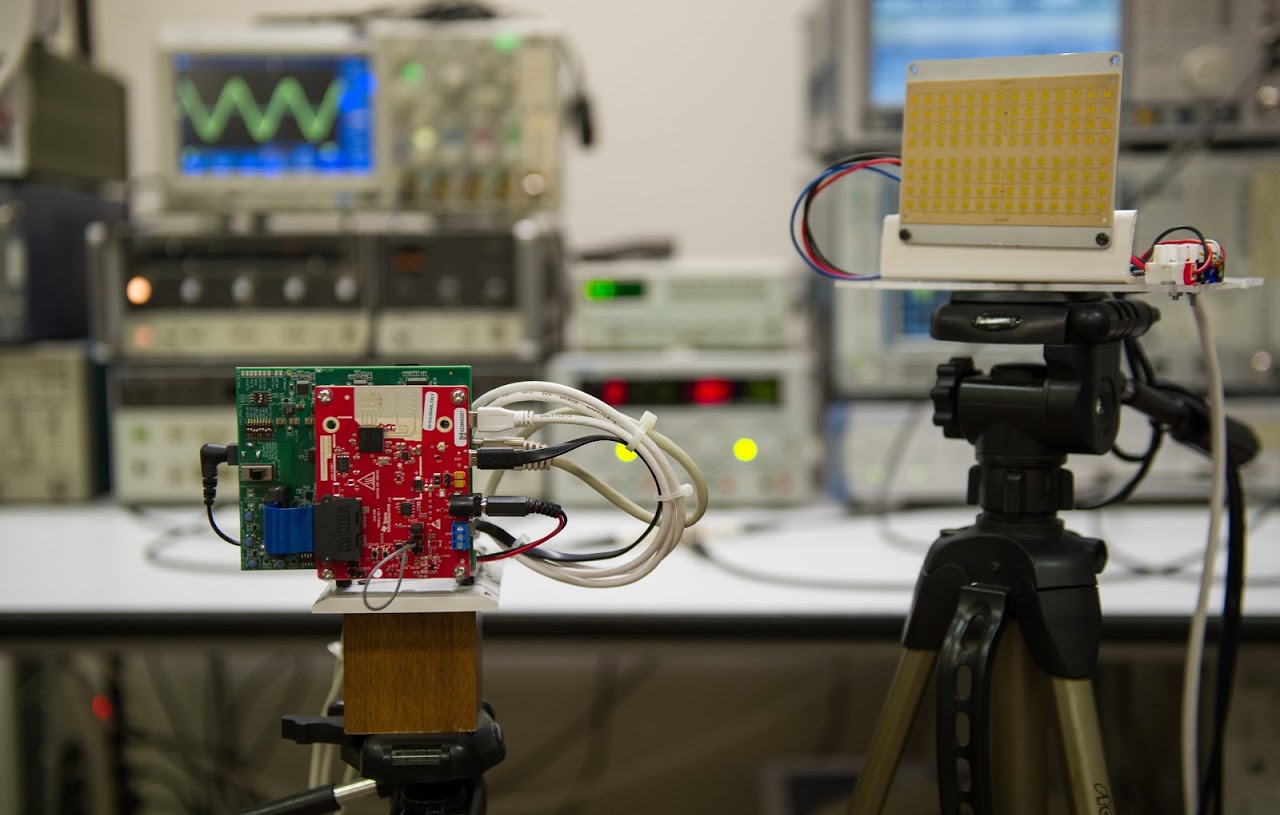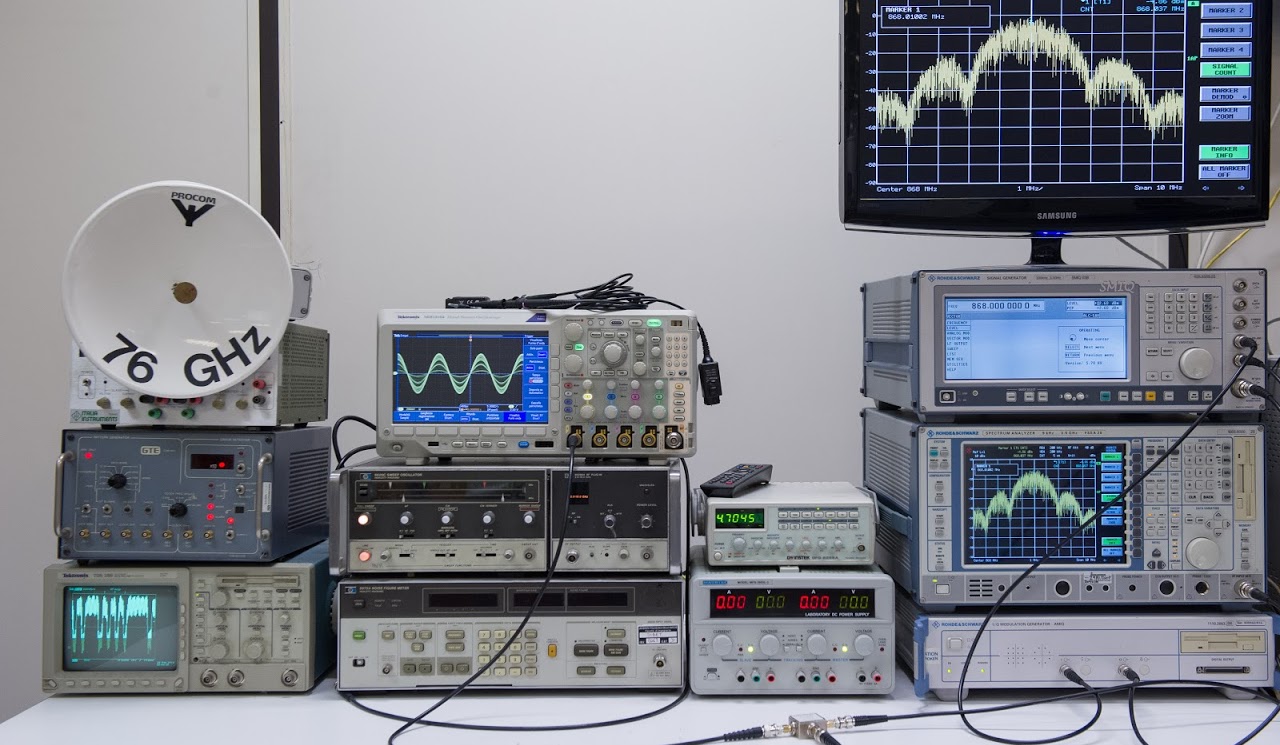A significant part of the research activity concerns basic research, with the aim to increase understanding of fundamental principles. This provides a solid cultural starting point for the development of a number of activities more oriented to the application. A natural bridge in this sense is provided by the presence, within the Department, of a number of Laboratories.
A short list is as follows:
| μElab | |
| The main activities of this laboratory concern: Measurement instruments and software for the design of electronic systems and integrated circuits, FPGA, RFId. More information can be found at https://www.dii.univpm.it/mElab |
| AIRTLAB | |
| The activities of this laboratory are currently focused primarily on Real-time Operating Systems. Various research activities are carried out that have as their field of application two real-time operating systems: Shark and Erika. The objective is to conduct experiments to evaluate the performance of the two real-time operating systems comparing them with those of the most popular general purpose operating systems. More information can be found at https://airtlab.dii.univpm.it |
| Microwave Lab | |
| This laboratory is involved mainly in measurement of microwave components and subsystems |
| LORA – Lab. of Operations Research Applications | |
|
Researchers, practitioners and students of the LORA research group are mainly interested in (Discrete) Optimization, a cross domain subject lying between Operations Research, Computer Science, Applied Mathematics and Engineering. In particular, the members of the LORA research group are engaged in the development of mathematical programming model and discrete optimization algorithms for complex decision-making problems arising in several application domains (software engineering, manufacturing systems, supply chain, transportation and logistics). More information can be found at LORA web site. |
| Antennas and EMC | |||||
The antenna laboratory allows the antenna radiation pattern determination and the antenna impedance measurement. The EMC laboratory allows the emission and immunity measurement of equipments in reverberation chamber, including ESD and EFT tests.
|
| Microelectronics | |
| The main laboratory activities are related to the design, measurements, analysis and testing of integrated circuits and electronic systems. |
| Artificial Intelligence | |
| The main laboratory activities are related to: the study of biological and synthetic signals, neural networks, signal processing and identification, the implementation of electronic embedded system for signal processing and recognition. |
| Automatic Laboratory (Ancona) | |||||
| The AUTOMATION LABORATORY is a laboratory for automation, robotics and programming of autonomous dynamic systems and industrial systems. The laboratory aims to support design, construction and research activities on intelligent dynamic systems. It deals with design, control and programming problems of automatic systems that include machines for industrial production, mechatronic systems, cyber-physical-systems, mobile vehicles and more, up to dealing with topics of artificial intelligence, perception, and systems navigation of autonomous systems. In this laboratory it is possible to experiment basic knowledge regarding the design of robotic and automation systems on a small or real scale. Moreover, within it systems can be equipped with appropriate tools to operate at high performance or autonomously in internal or external environments by applying them the state of the art of control algorithms, perception, and navigation up to artificial intelligence tools. Different technologies are used within the laboratory, particular emphasis is given to applications implemented on "embedded" microcontrollers, i.e. computing systems incorporated into the systems to be controlled and managed. In the laboratory, most of the important technologies are used to actuate, sensing and control robots and most in general automated systems. Some relevant examples of applications developed in the laboratory are automatic production and packaging machines, aerial vehicles such as quad copter or coaxial rotor aircraft, walking robots, wheeled vehicles, cars, motorcycles, and other autonomous systems.
|
| LISA – Laboratory for Interconnected Systems Supervision and Automation | |
| This laboratory was created with the aim to provide students some tools for the studies of complex interconnecting systems. The laboratory is equipped with multiple interconnecting stations on scale that realize a flexible system, which carry out different processes according to various automated layout. The aim is to study of the automation and control of interconnected systems and propose solutions for the management and interpretation of data from various phases of the production process so to increase the overall efficiency. Study of systems modeling, control and supervision of production systems by means of logical discrete event (DES). In addition, with the collaboration with an external company, the Lab will be equipped with apparatus and tools so to emulate the functioning of a Building and Home Automation system that integrates energy-consuming sources for heat and light power supply, such as heat pumps and artificial lights with green energy-supplying sources like fresh air flow and natural illuminance. The main interest is to be able to test different control architecture solutions combined with supervisory logic modules with respect to both typical control performance index and energy consumption reduction. |
| ITA3 Laboratory of Industrial plants, Technologies and Automation (Fermo) | |
| This laboratory was created with the aim to provide students some of the most modern tools for the study of production processes, production systems and logistics, industrial automation and supervision control. The laboratory is equipped with a CNC workstation and with multiple interconnecting stations on scale that realize a flexible system, which carry out different processes according to various automated layout. The possibility offered by the laboratory to verify, by means of simulation analysis and control, the methods learned in courses of study constitutes a significant contribution in the completion of the course of studies. The availability of both simulation software and hardware models gives the possibility of analyzing from a multi-disciplinary point of view the system performance. The distinctive industrial features of the activities carried out contributes to reinforcing the link between academia and manufacturing by promoting the integration of graduate students into future work. |
| 3Medialabs (A3lab, Semedia) | |
| The laboratory activity is focused on Audio and Speech processing applications. The lab is provided with tools and equipments for real time experiments, composed by several professional sound cards, professional microphones, loudspeakers, headphones, amplifiers, preamplifiers, two professional audio mannequins used for spatial audio experiments and several workstations. Furthermore, a large audio semi-anechoic chamber with dimensions of 11x9x6m is under construction and it will be used for the experiments. |
| Advanced Robotics Laboratory | |
|
The Advanced Robotics Laboratory activities concern the investigation of theoretical aspects, the development of algorithms and simulation tools and their application to embedded real-time control solutions of industrial dynamical processes. The research interests include the analysis, design and development of advanced methods for fault detection and control of robotic, electromechanical, electrical and flying robot systems. Modelling, estimation and system identification of physical system dynamics are also within the research topics to develop model-based and data-driven methods for fault diagnosis and control of mechatronic systems. The support of Texas Instruments within the "European University Program" allow the implementation of prototypes based on embedded industrial platform, very useful for research activities and technology transfer capabilities. The laboratory is equipped with: robotic manipulators; mobile robots; drones; a laboratory system that acquires the electrical and dynamic characteristics of electrical motors, powered in AC voltage (singlephase and threephase); DSP-based control systems for three-phase asynchronous and permanent magnet synchronous electric drives; DSP-based control systems for electric power converters |
| Laboratory of Artificially Intelligent Robotics (former Robotics Laboratory) | ||
|
The Laboratory of Artificially Intelligent Robotics (LAIR) is an interdisciplinary laboratory, which hosts researchers in different fields of automation and robotics. The main research activities are:
The laboratory is equipped with:
|
| RIOT Lab – sensoR networks and Internet Of Things Laboratory | |
| The Sensor Networks and Internet of Things laboratory is a research and didactical structure of the Department of Information Engineering, Polytechnic University of Marche. The lab is attended by researchers, PhD students, scholarship holders, theses and researchers in the Telecommunications area and other disciplinary sectors. In this lab, studies, design and performance analysis are carried out about the following research fields: Telecommunication Protocols; Wireless Sensor Networks for the Internet of Things; Interconnection and Interoperability Protocols for the IoT; Wearable and NonWearable Systems; Internet of Medical Things (IoMT); Ambient Assisted Living; Solutions and Services based on Bluetooth and Beacon Bluetooth; NB-IoT Technology; Indoor and Outdoor Localization; Network Architectures for Industry 4.0; IoT Solutions for Smart City, Smart Metering, Smart Environment; Seismic and Structural Monitoring; Early Warning Systems; etc. |
| Computational Audio Processing LAB | |
| The Computational Audio Processing LAB is a research and didactical structure operating in the area of Digital Signal Processing and Computational Intelligence for Digital Audio applications. The laboratory’s main equipment includes multiple GPU-powered computers for extensive Machine Learning simulations and a large variety of microphones and professional soundcards |
| Steinberg LoLa Studio LAB | |
| The Steinberg LoLa Studio LAB is a research and didactical structure operating mainly in the area of computer music production and sound design. The lab is equipped with 6 desktop GPU-powered computers, with professional headphones and soundcards, and suitable hardware for low latency audio visual streaming including a workstation, a digital mixer, a digital camera, audio/video monitors and microphones. |
| DSP Audio and Semi-Anechoic Chamber | |
| The DSP Audio LAB is a research and didactical structure operating in the area of Digital Signal Processing applied to Digital Audio applications. The laboratory is equipped with a Semi-Anechoic Chamber of dimensions 9 m x 7 m x 5 m and qualified ISO 3745 that allows to perform acoustic analysis in free field conditions exploiting professional audio equipment (sound cards, microphones, loudspeakers, amplifiers, pre-amplifiers, mixer, headphone, binaural mannequins, phonometer). |
| Electronic Measurements and Instrumentations Lab | |
|
The Electronic Measurements and Instrumentation Lab supports teaching and research activities focused on measurement science, electronic instrumentation, sensors and transducers. The Lab is being equipped with several sensors and transducers (inertial measurement units, RGB-D cameras, accelerometers, pressure sensors, PPG sensors, GSR sensors, wearable devices like Empatica E4 smartwatches), electronic boards for rapid prototyping and testing of smart sensing systems, as well as some traditional measurement instruments (portable and desktop digital multimeters).
|
| CII | |
|
The Centre for Innovation and Entrepreneurship (C2I) is an interdisciplinary and interdepartmental center, jointly set-up by the Department of Information Engineering (DII) and the Department of Industrial Engineering and Mathematical Science (DIISM). |
| ICT Lab | |
| ICT Laboratory is the convergence point of Telecommunication System Team activities. The LAB is used for research, didactical activities and is the place where ideas are shared and different points of view get in touch. In the LAB you can find people studing, testing prototipes or having lectures. We offer a complete set of measurement instruments devoted to RF signal analysis and generation both in frequency and time domain. Many complementary devices are stored in the LAB, like Software Define Radios, mmWave Radars, microwave Links, IoT sensors and much more. Great importance is given to devices which realize our "advanced networking lab". Here you can find Huawei and other vendors equipment which enable students to increase their skills in networking, security and wireless. Equipment is increasing every year as we try to keep the pace with emerging technologies. | |
  |
| Cybersecurity | |
| The Cybersecurity laboratory of the telecommunications group hosts technologies and skills regarding data and network security, with focus on cryptographic algorithms and protocols, network security techniques and blockchain and distributed ledger technologies. The tools of the Cybersecurity laboratory allow to design, validate and test techniques for data and network protection, with typical ethical hacking skills, and are available for scientific and applied research activities, as well as for project activities in collaboration with companies and other institutions. The laboratory participates to the CyberChallenge.it initiative, aimed at training ethical hacker teams and participating to national and international competitions in the field of cybersecurity |
| Cardiovascular Buoengineering Lab | |
|
The Cardiovascular Bioengineering Lab is equipped clinical and wearable instrumentations (Holter ECG and chest strap) for the noninvasive acquisition, storage and management of cardiovascular signals (electrocardiogram, blood pressures, heart rate series, etc.). Additionally, in the lab are present software applications for modelling, processing and classification, also through advanced computational learning techniques, of cardiac signals and images for sport applications and clinical applications in fetus, infant and adult.
|
